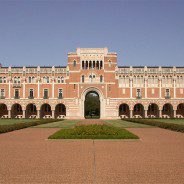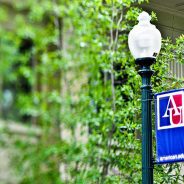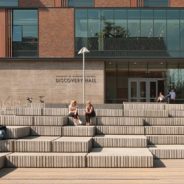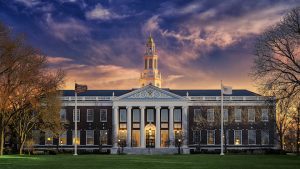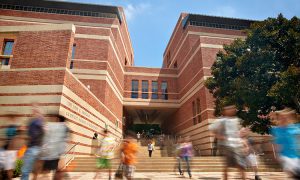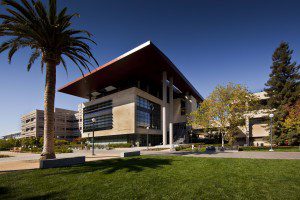Search results for career:
MBA Battle: BU Questrom v. BC Carroll
Boston College and Boston University are two of the metro’s most popular and recognizable schools. But for two schools with a lot in common, BU and BC don’t seem to like each other much. Continue reading…
Toronto Playoff Success Is Good For Business, and More – Toronto News
Playoff Fever for Leafs, Raptors Fans – CityNews Toronto
With the NBA and NHL playoffs about to begin, Schulich School of Business sports marketing professor Nitish Bissonauth talked about the underlying financial positives of repeated playoff appearances. Which is pretty good news for the Toronto Raptors and Maple Leafs.
Watch the video below, via CityNews Toronto.
Golf and Tennis Executive Raises His Game After Earning MBA – The Globe & Mail
David Main, the general manager at the Toronto Lawn Tennis Club, has held senior management positions at various Ontario golf and tennis clubs for the past 10 years. He credits his MBA education from Western University Canada’s Ivey Business School with giving him the tools he needed to thrive in this field. Due to Main’s use of his MBA education to pursue a career in the golf and tennis industry, The Globe And Mail featured him in its most recent addition to a series on graduates utilizing their MBAs in non-traditional fields.
“Mr. Main says he started his MBA at 34 and was part of a small group of students at Wilfrid Laurier University in Waterloo, Ont., who were about 10 years older than the rest of the class. He felt comfortable enough in the room – and more comfortable than the year prior, when he took a few undergrad business classes to brush up on basic concepts alongside 18 and 19-year-olds—until he said what he did for a living.”
“‘I was the oddball,’ he admits. ‘We’re going around the room and introducing ourselves. And there were people in finance at TD [Toronto-Dominion Bank], working at KPMG, working with PriceWaterhouseCoopers, and I was like, ‘I’m a golf professional.'”
Read more about David Main’s trajectory here.
The Global Housing Crisis – CityLab
Richard Florida, the Rotman School of Management professor and director of cities, along with Benjamin Schneider, recently wrote with CityLab about how the housing crisis has moved beyond a regional issue into a truly global one.
“The global housing crisis reflects a fundamental paradox of contemporary capitalism. Cities around the world are more economically powerful and essential than ever. This creates tremendous demand for their land, leading to escalating housing costs and competition.
Meanwhile, housing has been financialized and turned into an investment vehicle, which has caused an oversupply of luxury housing and a lack of affordable housing in many cities across the world. The global housing crisis is defined by a chronic shortage of housing for the least advantaged, and in many cases, for the working and middle classes as well.”
The two also noted that the perceptions of the world’s most expensive cities to live is a bit misguided. “The world’s most unaffordable housing markets are not New York, London, and Los Angeles, or even San Francisco, but Hong Kong, Sydney, Vancouver, and Melbourne,” they write. “London, Toronto, and Brisbane are also high up the list. Housing is also terribly unaffordable in Tokyo, Singapore, Shanghai, Beijing, Moscow, Paris, Stockholm, Amsterdam, Geneva, Rome, Milan, and Barcelona, according to other studies.”

A sweeping view of Villa 31, Buenos Aires / Photo via Natacha Pisarenko/AP
You can read more from Florida and Schneider here.
Where Toys R Us Went Wrong, Sawyer International Business Etiquette, and More – Boston News
Let’s explore some of the most interesting stories that have emerged from Boston business schools this week.
Here’s What Sunk Toys R Us – MIT Sloan Newsroom
Experts from MIT Sloan offered a few choice insights into what Toys “R” Us, whose future currently remains in flux, could learn from the hiccups along its 70 year-long history.
Senior lecturer in work and organization studies Peter Kurzina writes that Toys “R” Us “ignored Amazon eating their lunch, thus failed to prepare and meet the challenge of competition.”
Associate professor of finance Andrey Malenko, a fellow MIT Sloan colleague, also critiqued the toy giant’s enormous debt burden. “If you’re running a business that might be sensitive to e-commerce, to the recession, then loading up on debt as much as [Toys “R” Us] did, it’s very risky and you probably shouldn’t do it.”

In March 2018, Toys “R” Us announced it would be closing all US and UK locations.
Read more of the duo’s analysis here.
International Business Basics – Sawyer Business Blog
The act of doing business across cultures often entails unexpected byproducts that Sawyer addressed in its recent “Business Protocol Across the Globe” forum, organized by Colombian native Laura Reales, BSBA ‘18.
“What if I wanted to move to another part of the world, like Saudi Arabia or France or China? How could I make connections with people so that I don’t look ignorant of their culture? So I decided to create a space where it was ok to talk about those differences.”
Read here to learn the answers to questions like, “What’s the proper way to present a business card in China?” and “What’s a good way to begin a negotiation in Turkey?”
Alumnus’ Company serves the Housing Needs of a Vulnerable Community – D’Amore-McKim Blog
The Northeastern University D’Amore-McKim School of Business profiled alum Andy Rosenthal, a 2007 alum who abandoned a lucrative career in hedge fund software to co-found the Terenbinth Group, which has become the “largest, family-owned provider of housing to people with intellectual and developmental disabilities.” Rosenthal explains his company’s model.
“We’re a real estate company focused on providing quality, safe, affordable housing to a vulnerable community,” Rosethal said in the interview. “In short, we find homes, fix them up, customize them to suit the tenants—think wheelchair accessibility, replacing door knobs with door levers, waterproof flooring, installing roll-in showers, etc.—and then rent them directly to the individuals.”
The company’s 68 homes currently accommodate more than 225 people across the state of Indiana and it’s looking to expand. You can learn more about the Terebinth Group’s plans here.
What are the Best Real Estate MBAs in Boston? – MetroMBA
Earlier this week we highlighted the three strongest Boston metro schools that can help you earn your way into the real estate industry: Harvard Business School, MIT Sloan, and the Babson College F.W. Olin Graduate School of Business.
Regarding Babson, writer Jillan Markowitz writes:
“At Babson College’s F.W. Olin Graduate School of Business, MBA students can pursue the finance concentration, which offers several courses in real estate. Students can rake courses like Real Estate Financial Modeling, Real Estate Fundamentals, or Real Estate Development. According to recent Olin graduate employment statistics, 10 percent of the 2017 MBA class landed jobs in real estate. This number may not seem overwhelming, but it dwarfs the percentage seen in many MBA programs (usually about two to three percent).”
Learn more about the best real estate programs in Boston here.
Rice University – MBA@Rice
History
Rice University’s Jesse H. Jones Graduate School of Business is one of the university’s seven academic units. The school was named after the late Jesse Holman Jones, a prominent Houstonian and world-renowned business and civic leader. The school received its initial funding in 1974 through a major gift from the Houston Endowment, a philanthropic foundation established by Jones and his wife, Mary Gibbs Jones. Rice offers three MBA programs: full-time MBA, MBA for Executives, and MBA for Professionals. The Rice MBA Program is accredited by AACSB International.
School Rankings
• U.S. News & World Report: 23 (tie)
• Bloomberg: 26 (U.S.); 30 (Global)
• Forbes: 32
• Financial Times: 45
• The Economist: 41
Location
Rice University’s main campus is located on a 295-acre campus in Central Houston, Texas. The university is situated near the Houston Museum District and adjacent to the Texas Medical Center.
The main campus is located less than 15 miles away from the Hobby Airport and around 25 miles away from the George Bush Intercontinental Airport.
Facilities
The Rice University MBA program is housed in McNair Hall. The 160,000 square foot building was constructed in 2002. The ground floor of the building has amenities such as a 208 seat dining room, student, faculty and executive lounges and the 460-seat Shell Auditorium. The second and third floors house the School’s library, classrooms, and faculty offices.
The El Paso Corporation Finance Center is one of the academic facilities available for Rice MBA students. The center is equipped with a variety of tools to train students for future careers in finance. This includes workstations with video conferencing equipment, a variety of high-tech monitors, TVs and projectors, and resources including Bloomberg Professional, CountryWatch, and Capital IQ.
The Gilbert and Ruth Whitaker Business Information Center is also open to Jones students. The library occupies the second and floor of McNair Hall. It includes a room for reference materials and journals, a separate room for the circulating collection, and a large reading room. The information center also features several group study rooms, carrels, and online resource rooms.
Faculty
The faculty at Rice are highly accomplished, with professors in the business department being known for their numerous publications in scholarly journals. There are nearly 100 faculty members working in the business program, with 33 having tenure status. Academic areas that they teach include accounting, communications, entrepreneurship, and information technology, finance, marketing, organizational behavior, and strategy and environment.
Student Body
The most recent graduating class from Rice Jones featured over 340 students. More than 100 students are enrolled in the full-time MBA class, and 145 are enrolled in the professional MBA class.
MBA Degree Offerings
Rice University features three MBA programs: full-time MBA, Executive MBA, and a Professional MBA. There are also dual degree options available, such as the MBA/ME, MBA/PSM, and MD/MBA
What are the Highest Paying Finance Companies for MBAs?
Let’s face it: even if money isn’t the number one reason you are looking into an MBA, it’s probably pretty high on the list. We know that earning an MBA can not only lead to a raise in salary, but can open the door to even more career opportunities that can further increase your earning potential. For those with money on the mind, there’s a lot to consider when pursuing your MBA, from which specialization will give you the most ‘bang for your buck’ to what kind of future employers most value their MBAs.
One of the top industries that consistently makes the list when looking for the most valuable MBA specializations is finance. With an average salary of $121,000 USD for jobs within the finance industry, having or working towards your MBA is a reality of the field. But for those who are willing to put in the work, finance companies are willing to pay.
The 5 Best Paying Finance Companies For MBAs
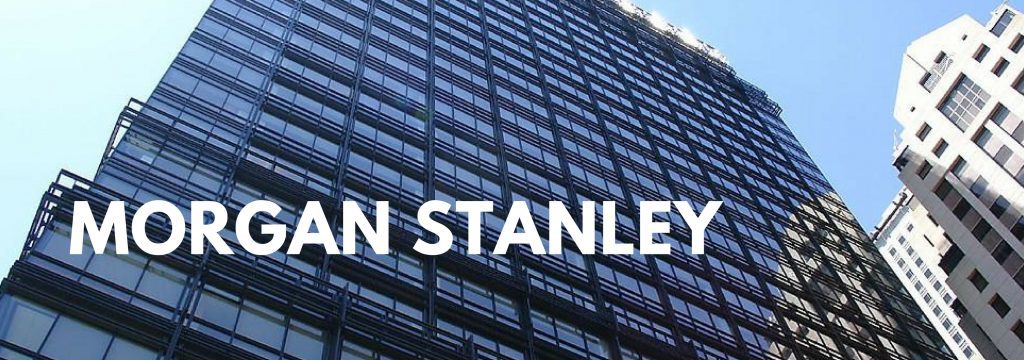
One of the places where MBAs are earning top dollars is Morgan Stanley, a financial services firm that provides a number of financial advising services, such as wealth management, investment banking, sales and trading, research, and more. Morgan Stanley is an active recruiter of diverse business school and MBA graduates, with their most recent cohort of recruits coming from 56 different countries. The company offers graduates a number of different ways to get their foot in the door, including a number of summer internships and fellowships designed specifically for MBAs.
It’s clear that Morgan Stanley believes in investing in the MBAs on its staff. While the average salary at the company is in the $75,866 range for those with just a bachelor’s degree, employees have reported average salaries around $100,477 after earning an MBA.
Depending on the job and department within the company, earning potential can be even higher. Within the firm’s investment banking department, salaries can reach over $200,000. One reason for Morgan Stanley’s high numbers come from their reputation to dole out tremendous bonuses, which—combined with the base salary—makes this company one of the highest paying firms for MBAs in finance.

Godman Sachs Group, Inc., a multinational finance company that focuses in global investment banking, investment management, securities, and a number of financial services. Founded in 1869, the company today has 34,000 employees throughout the world and revenue of more than $42 billion. Goldman Sachs makes a number of opportunities available to recent MBA graduates and current students, such as the Goldman Sachs MBA Fellowship which recognizes outstanding business students with a role as summer associate and $35,000 award in addition to the associate’s salary.
According to Payscale, MBA holders at Goldman Sachs earned a median salary of $96,844. With such a high number of diverse MBAs working for their organization, this average includes the salaries of finance managers, CFOs, financial analysts, financial controllers, and many other positions that MBAs might hold within the company.
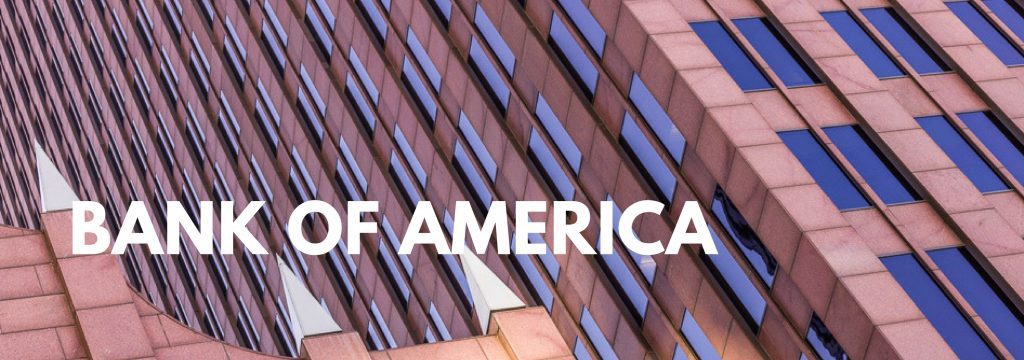
Bank of America began more than a hundred years ago, undergoing a series of expansions and mergers that ultimately led the company to its role as one of the ‘Big Four’ banks of the United States. Today, Bank of America makes more than $87 billion in revenue and employees a whopping 208,000 employees throughout the world. Through campus recruiting, diversity fellowships, and summer internships, Bank of America actively seeks talented MBA students and recent graduates. Through the full time analyst and associate programs, graduates work full-time in a structured program that offers consistent training, development, and social opportunities.
Bank of America employees with MBA degrees report an average salary of $101,522. Programs dedicated to hiring and training MBAs, such as the Bank of America MBA Leadership Development Program, matches these exceptional salaries, offering recent graduates impressive professional development opportunities as well as salaries ranging from $94,918-$101,733.

Headquartered in Zürich, Credit Suisse Group is a multinational financial services holding company with a heavy presence in the United States. With more than 48,000 employees worldwide, Credit Suisse in 2014, was said to hold more than $888 billion of assets under management. Credit Suisse offers several pathways for MBA graduates to become involved at their company, offering positions as full-time analysts, associates, and career starters.
Depending on the role, there can be a wide range of salaries recent graduates might earn when they join Credit Suisse in an analyst positions. Positions like investment banking analyst or business analyst are likely to make upwards of $70,000-80,000, with the opportunity to turn your degree into much more as you move up through the ranks. The average salary for an MBA with a finance specialization, according to Payscale, is $120,414.
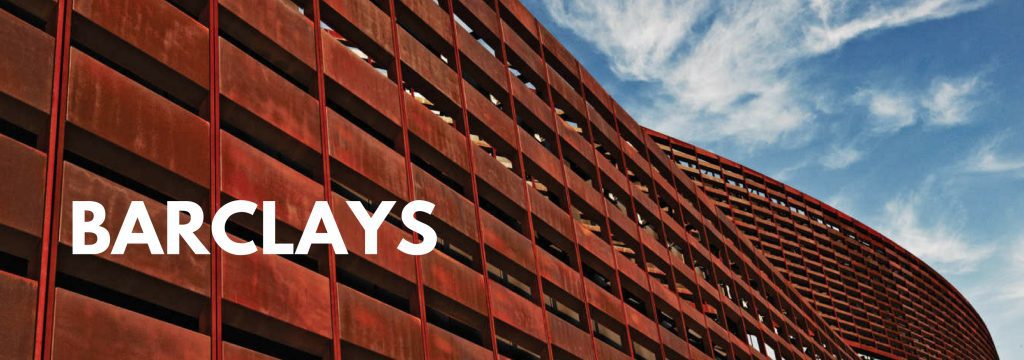
Barclays, a British multinational bank and financial services company, is well-known today for its global reach, employing more than 120,000 people and operating in more than 40 countries. Like the other high-paying financial firms on this list, Barclays offers a number of opportunities to draw talented MBA graduates to their company. Programs like Barclays MBA Ambition gives MBA candidates the chance to get a summer internship at the company even before beginning their program, allowing them to focus fully on school once it starts while feeling confident about the future. This fellowship, for example, offers $45,000 toward first-year tuition with the opportunity for an additional $45,000 in their second year if they choose to join Barclays full-time after graduating. On average, salaries for recent graduates can range from $69,588-$74,898.
Georgetown Launches New MBA Certificate in Consumer Analytics and Insights
In response to overwhelming demand by students and recruiters, Georgetown University’s McDonough School of Business launched a new MBA Certificate in Consumer Analytics and Insights. The certificate delves deep into marketing data and analytics to provide MBA students with the necessary skills needed to drill down into consumer behavior and marketing practice through data. Continue reading…
What are the Best Real Estate MBAs in Boston?
Despite episodic waves of unrest, real estate is a worthy investment. More importantly, real estate is a cornerstone of the world economy. The importance of understanding the intricacies and nuances of this complex field cannot be overstated.
In Forbes, Yolanda Barnes, who runs Savills World Research, said, “real estate is the pre-eminent asset class which will be most impacted by global monetary conditions and investment activity and which, in turn, has the power to most impact national and international economies.” For the B-school-bound, becoming fluent in real estate’s many facets can provide a valuable edge in nearly every area of business.
Below, we’ve laid out the best Boston real estate MBA options for those looking for careers in the industry.
Harvard Business School
It would be remiss to talk about business education in Boston without mentioning Harvard Business School. HBS is easily one of the most reputable business schools in the world. Forbes places the university in its top three “Best Business Schools.” For those pursuing real estate, Harvard MBA’s have access to the Harvard Business School Real Estate Club, which provides its members with opportunities for supplemental real estate education, training, and extensive networking. Harvard also hosts an annual Real Estate Weekend, wherein students can buy tickets to attend development workshops and fireside chats with industry experts.
F.W. Olin Graduate School of Business – Babson College
At Babson College’s F.W. Olin Graduate School of Business, MBA students can pursue the finance concentration, which offers several courses in real estate. Students can rake courses like Real Estate Financial Modeling, Real Estate Fundamentals, or Real Estate Development. According to recent Olin graduate employment statistics, 10 percent of the 2017 MBA class landed jobs in real estate. This number may not seem overwhelming, but it dwarfs the percentage seen in many MBA programs (usually about two to three percent).
Sloan School of Management – MIT
MIT’s Sloan School of Management offers an MBA that incorporates real estate education. Though the school also offers an MS in real estate development (MSRED) for those more focused on earning a degree in real estate than an MBA, the MBA finance track offers a different set of advantages. This track zooms in on the finance-related areas of real estate, such as investment, urban economics, and housing economics. The MBA real estate courses zero in on the financial component of the industry and the core MBA courses also help students build a broad foundation in business. MBA students pursuing a certificate in finance can take courses like Real Estate Finance and Investment and Real Estate Capital Markets.
Philly’s Fastest MBA Programs
You’re education is important—but so is your time. And for those looking to earn an MBA to accelerate their job growth or fast track their careers, the faster you can earn that degree the faster you can get back to earning money and making an impact in your field.
Most business schools offer a variety of MBA programs for students to choose from, allowing everyone from recent graduates to experienced executives the flexibility to choose a program that best fits into their life and schedule. For driven students who just can’t wait to reap the benefits of their MBA, many schools offer accelerated or One Year MBA programs that shortens the traditional length of time it would take to earn an MBA. While the curriculum can be rigorous, the programs give students the chance to quickly earn their degree, both minimizing the amount of money spent on classes and the income lost from not working full time.
In Philadelphia, there are a number of programs that allow you to go from applicant to degree holder in as little as twelve months. And since a 2017 study ranked Philadelphia as one of the five most-improved economic cities in the U.S., you won’t want to miss your chance to reap the benefits of this economic boom with your degree in hand.
The Fastest Philadelphia MBA Programs
Fox School of Business – Temple University
The Temple University Fox School of Business Executive MBA is one of Philadelphia’s quickest and most flexible MBA degrees. The program takes place over the course of 16 months, with classes delivered on one three-day weekend per month. The program is designed for experienced professionals who want to pursue their degree without giving up their career, and is constructed to accommodate a full-time work schedule.
For those looking for a quick MBA without the ten or more years of work experience an EMBA requires, Temple Fox’s Online MBA can be earned in just 20 months. Outside of one week-long residency at the start of the program, the digital aspect of this degree gives students not just time flexibility but also location. After the residency, this program can be pursued from pretty much anywhere!
LaSalle University School of Business
The School of Business at LaSalle University offers a One-Year MBA program for students with undergraduate experience in business. Knowing that important business pre-requisites for the degree are already out of the way, students can jump right in and earn their MBA in as little as 12 months.
The AACSB accredited One-Year program is an intensive degree program that requires students to take a full course load for the fall and spring semester as well as working through a winter intersession and summer semester. Students in this program also have the opportunity to specialize their degrees in the fields of accounting or finance, and will help prepare graduates to take the CPA and CFA exams by the end of the year. Students will also be paired with an academic adviser throughout the year who will help plan for their future careers. And the success of past graduates of the One-Year MBA program seems pretty clear, joining major companies like Deloitte LP, KPMG, PwC, and JP Morgan Chase, among others.
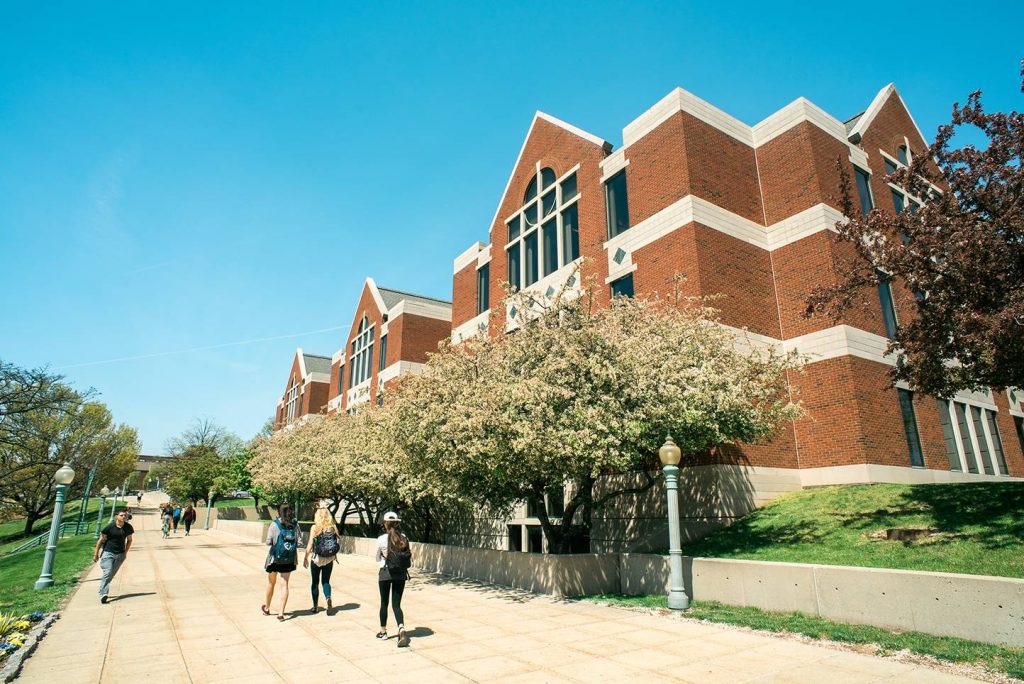
The La Salle One-Year MBA is among the fastest MBAs you can earn in any major East Coast city.
Haub School of Business – Saint Joseph’s University
The MBA at Saint Joseph University’s Haub School of Business can be completed in as little as one year for students who meet certain undergraduate requirements. Students can pursue this degree in a variety of ways, whether on campus or online, and whether full or part-time. Regardless of format, the MBA at Haub gives students the option to choose major for their degree, among high-demand disciplines like marketing, data intelligence, finance, international business and more.
The overall data which shows that those with an MBA earn more and have more career opportunities most certainly rings true for graduates of Haub’s MBA program. Nearly 76 percent of graduates said their SJU MBA helped their career advance, and 73 percent reported a salary increase as a result of their graduation. With the chance to limit the time of an SJU MBA to just 12 months, students can work their way to these benefits even faster.
Lehigh University College of Business and Economics
The 1-MBA at the Lehigh University College of Business and Economics is a full-time, one year MBA program designed for professionals looking to either accelerate their career or looking to change careers and move towards a business-related field. The rigorous program, which is located all on campus, cuts the time it takes to pursue a traditional Lehigh MBA in half.
Unique benefits of the 1-MBA at Lehigh include a team of mentors and coaches assigned to students even before they arrive on campus, including a faculty adviser, industry mentor and career coach who will help guide students through their year-long program. The program is also centered around a consulting practicum, which both trains students in practical skills for consulting and provides hands-on experience in the field. The 1-MBA program also focuses intensely on the professional development of every student in the program, offering personalized coaching and global immersion study opportunities that can help shape and prepare students for future business success.
American University – Business@American
History
American University’s Kogod School of Business has been educating business leaders since opening its doors in 1955 as Washington DC’s first university-level school of business. Faculty members are scholars who are dedicated to fostering collaborative learning environments. This hands-on, team-based approach is designed to produce graduates with the relevant management, problem solving, and critical thinking skills needed to become highly effective business leaders.
The school is accredited by the Association to Advance Collegiate Schools of Business.
School Rankings
• Bloomberg: 72 (U.S.); 90 (Global)
Location(s)
Located in the nation’s capital, where decisions on policy and regulation regularly affect the ways business is conducted and technology is used around the world, the School of Business’s campus is situated on Massachusetts Avenue in Washington DC. Blocks away from many embassies and government offices, its location provides the sort of insight into the policy making and regulatory communities that only proximity can bring.
The main site of the Kogod School of Business is located less than 10 miles away from the Ronald Reagan Washington National Airport.
Facilities
In early 2009 the Kogod School of Business dedicated a new facility to improving the learning experience of the Kogod community. The three-story building connects seamlessly with the existing building, enabling Kogod to hold all of its classes in one location, and opened in 2000.
The Kogod Career for Career Development is located on the new first floor, and the Financial Services and Information Technology Lab can be found on the terrace level as a data and computing center for students. The lab is outfitted with Thomson Reuters technology, which includes three unique financial products, allowing students to access streaming market news and changes, global developments, quotes, and data on over 55,000 public companies.
Faculty
Kogod employs over 80 faculty members who teach courses across five academic departments: Accounting, Finance and Real Estate, Information Technology & Analytics, Management, and Marketing. In addition to holding advanced degrees, many professors at the American University Kogod School of Business have gained practical international business expertise through consulting, executive, and entrepreneurial experiences.
Student Body
Around 47 percent of the most recent Kogod School of Business MBA class are women, with 58 percent of students of minority status. The average age of the class is 31 years old, and most students have around six years of professional work experience.
MBA Degree Offerings
The American University Kogod School of Business offers a full-time traditional MBA, in addition to an Online MBA.
Top MBA Recruiters: Starbucks
American coffee behemoth and casual status symbol Starbucks has become one of the most well-known companies in the world with over 27,000 stores and a massive headquarters located in Seattle, Washington. The company is known its quality service, customizable drinks, and pre-packaged items. As it continues to grow, so does the appeal for a Starbucks corporate career.
The company got its start in 1971 when the first store was opened in the Pacific Northwest. However, it wouldn’t be until 1987, when Howard Schultz took over and re-branded the company that they would open their first location outside of Seattle. By 1989, it had 46 stores and were roasting over two million pounds of coffee.
In 1992, Starbucks released its initial public offering (IPO) with a revenue of $73.5 million and a market value of $271 million. By the end of the year, the share price had risen over 100 times the earnings per share of the previous year. Now, the company earns more than $22.3 billion per year and employs over 238,000 people worldwide.
You can’t talk about Starbucks without talking about the location of its headquarters in Seattle. Located in the city’s SoDo neighborhood, Starbucks can be found in the largest multi-tenant building in the city with over 2,200,000 square feet of space. But while the building is impressive, it’s the city that really stands out.
Washington was ranked as “America’s Top State for Business in 2017,” by CNBC, and Seattle is the city to be in. According to Outside Magazine, Seattle is one “America’s Best Towns Ever,” and a PWC survey considers it one of the nation’s most innovative cities. There’s much to love about Seattle from its opportunities for adventure, laid-back culture, and strong economy, which grew 3.7 percent last year—almost 2.5 times the national average.
MBA Recruiting at Starbucks
Starbucks is a major MBA recruiter. It looks for MBA students who understand who Starbucks is as a company. As well, it recommends reading former CEO Howard Schultz’s book, Onward: How Starbucks Fought for Its Life without Losing Its Soul and following the company on social media including LinkedIn, Twitter, YouTube, and Instagram. The company wants to know why you want to be a part of it and how you fit in with the Starbucks Mission Statement.
Other required qualities include:
- Strong analytical and technical skills
- Ability to analyze business trends
- A strong team player who can collaborate cross-functionally
- Strong interpersonal skills
- Great communication skills orally and in writing
- Strong organizational and problem-solving abilities
- Ability to balance priorities and meet deadlines
You may also be required to have a deep understanding of financial planning, forecasting, and inventory management. You should also have a strong understanding of marketing fundamentals and be able to understand sales, return on investments, and profit and loss.
As for where Starbucks recruits, many MBA programs feed into the company including:
- The University of Washington Foster School of Business
- Dartmouth College’s Tuck School of Business
- The Wharton School at the University of Pennsylvania
- Arizona State University’s W. P. Carey School of Business
- The University of Michigan Ross School of Business
Salary & Benefits of Starbucks Employment
According to PayScale, MBAs hired at Starbucks are paid well:
- Master of Business Administration (MBA), Business Administration – $128,500
- Master of Business Administration (MBA), Accounting – $65,111
- Master of Business Administration (MBA), Marketing – $109,823
- Master of Business Administration (MBA), General Business – $89,000
- Master of Business Administration (MBA), Global Management – $77,419
As for benefits, Starbucks offers a tailored benefits package that’s called “Your Special Blend,” which includes Medical, Dental and Vision coverage as well as life insurance, disability, adoption assistance, paid vacation, a 401(k) Savings Plan, stock investment, one free pound of coffee per week, and more. There are also perks that include in-store merchandise discounts, matching gifts programs, etc.
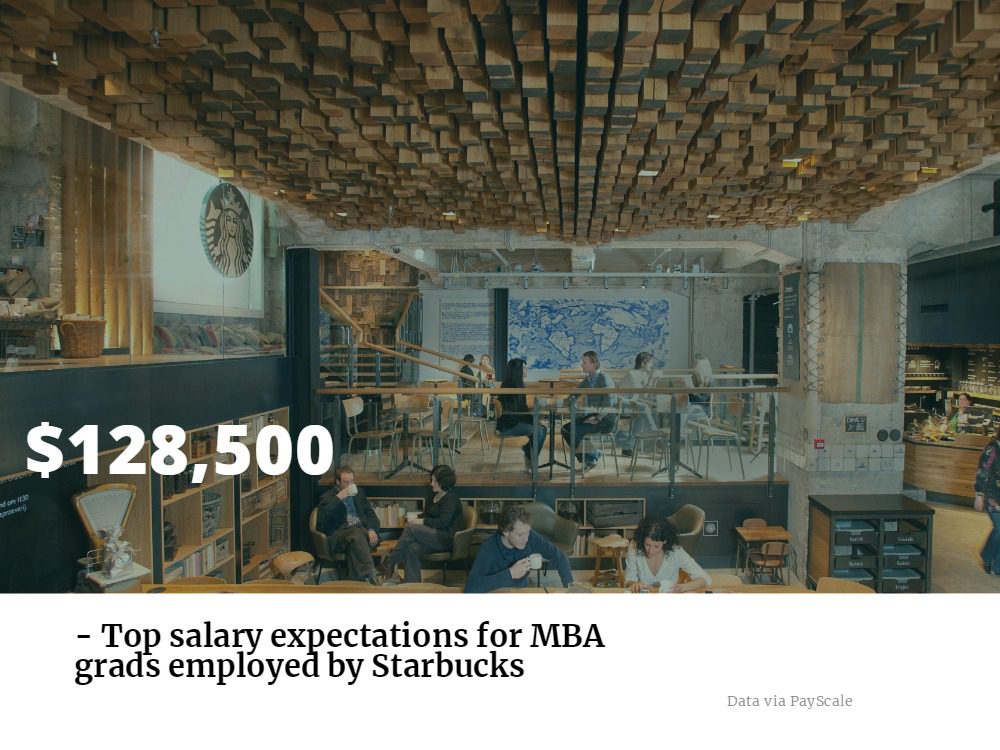
Interning at Starbucks
Every year, Starbucks offers an exclusive ten-week internship program in Seattle that is designed to provide a robust and meaningful experience. MBA students who are chosen to participate can expect to participate in high-impact, business relevant projects that have well-defined goals and expectations. Interns also have access to mentorship and leadership opportunities. Graduate internship applications open from January to February each year for the summer program.
According to Peter Kazarian, a ’16 UW Foster MBA graduate who interned at Starbucks, the intern program is very deliberate and well laid out.
“With part MBAs and the rest technical and undergrad interns, there was a formal on-boarding program, weekly meetings with SVP/C-suite leadership, and great experiences like a Sounders game or fancy catered dinners at museums,” Kazarian explained in a blog. “My department was under the Channel Development arm of Starbucks, which included consumer packaged goods and anything else not in a Starbucks retail store, like grocery bottled fB2brappuccinos, licensed stores, and in my case, bulk B2B customers like airlines, hotel chains, restaurants, and campus cafes. As part of the Digital and Loyalty team, my main project involved e-commerce enhancements to our B2B team’s website, and forecasting new sales revenue and cost savings from these changes.”
As for what Kazarian enjoyed most about his experience, he enjoyed the free pound of coffee each week. He also loved getting to know his fellow MBAs who are now good friends of his. “I had a great experience … and I’ll be returning to Starbucks … as a Product Manager,” he said.
NRA Boycotts, Food Deserts, and More – Chicago News
Let’s explore some of the most interesting stories that have emerged from Chicago business schools this week.
How the NRA Boycotts Force Companies to Walk a Precarious Tightrope – Kellogg Insights
In light of the recent Parkland and Great Mills school shootings, which attracted an estimated 200,000 protestors to the March For Our Lives rally in Washington DC late last month, Northwestern University Kellogg School of Management professors Brayden King and Tim Calkins discussed what companies susceptible to boycotts can do to build “strong, profitable brands.” Calkins explains the stakes of the game right now:
“The world of transparency we’re in combined with the world of social media means brands have to be very careful about what they’re doing, really scrutinize things in a way they never used to. All of a sudden, they’ve got a problem because of something they never even knew they were doing.”
“That certainly was the case with the NRA boycotts. I think if you were to ask a lot of these executives at these companies, “Do you offer special deals to the NRA?” most of them would have said, “No, we don’t have a partnership with the NRA.” It’s incredibly difficult right now to figure out how to respond. You have to move so quickly, but if you’re not careful, you’ll just make the problem bigger with a tone-deaf response.”
You can read the duo’s entire discussion here.
Nutrition Gap Between Rich and Poor is Growing, but Don’t Blame Food Deserts, Researchers Say – Chicago Booth Blog
Research from Chicago Booth professor of marketing Jean-Pierre Dubé, along with NYU’s Hung Allcott and Stanford’s Rebecca Diamond that reveals the minimal impact that food deserts have on eating habits. Dubé explains:
“One of the conclusions in our study is that opening a supermarket in a food desert has very little impact on the nutritional composition of households’ shopping baskets. People in food deserts shop in supermarkets almost as frequently as people living in higher income neighborhoods. They just travel longer distances to stores.”
The study found several variances of why these events were occurring, including vast educational differences and the willingness for upper-class consumers to pay more for vegetables and other produce.

“Food knowledge and education seem to explain a big chunk of the preferences for what people buy when they shop for groceries,” said Dubé. “If you are educated about the long-term benefits of nutrition, it could affect your shopping behavior.”
Learn more about the trio’s research here.
UIC Business Tackles “Back to College” with Target – UIC Business Blog
UIC Liautaud announced the results of its 2018 Management Leadership Association and Target Case Competition, an annual partnership between Target and the UIC Business Career Center, which invites “students to develop and present solutions to a unique challenge facing the company.”
Team Bersaglio’s “Target Move-In” proposal took first place, which attempted to eliminate the hassle for college students to “store items over the summer in preparation for college.”
The plan offered that students living on campus would “receive free shipments via specialized Target college gift registry” and could retrieve “purchases from a designated “Target Zone” on campus and receive customer service support and delivery assistance carrying packages to the dorms on move-in days.”
Read more about the competition here.
The Pacific Northwest MBA Conference Arrives April 21, 2018
On Saturday, April 21, 2018, the annual Pacific Northwest MBA Conference will be held at the T-Mobile HQ in Factoria, Bellevue, hosting an array of talented, experienced MBA professionals, recruiters, and executives together in a one-of-a-kind networking opportunity.
Learning from MIT Sloan’s First All-Female Senate Leadership Team
Women in leadership positions are still relatively rare. According to the latest report from MSCI, a research and analytics firm that helps leading investors build and manage portfolios, it could likely be 2027 before women fill just 30 percent of directorships in publicly held companies. Currently, they only hold 18.1 percent of such posts. But despite these discouragingly low numbers, significant progress is being made in other arenas. Recognizing and encouraging progress toward greater gender equity in business and in business school is extremely important if we want to help foster even more.
Fortunately, we need look no further than MIT Sloan School of Management to find clear signs of progress. During its most recent Senate election, two women were named co-presidents, marking the first time in the school’s history that its student government can claim an all-female top leadership team.
Avery Beach and Jennifer Zheng ran for co-presidents as a way to give back to MIT Sloan, a program that they said “has changed our lives.” They went on to explain, “Each of us felt strongly about the school’s potential and thought we could contribute to making it even better. We also believe that representation is extremely important. By running for co-president, we hope that we’ve inspired others, including underrepresented voices, to take on future leadership roles and continue Sloan’s mission to improve the world.”
Both women feel that it has been an extremely valuable opportunity to serve as the school’s first all-female Senate leadership team. In these roles, they have had a chance not only to develop their leadership skill set, but also to expand their network and impact their community.
“Our role as student leaders involves understanding how to influence key stakeholders, managing an organization of 60 students, and making frequent public speaking appearances,” explained Beach and Zheng. “We have learned and grown through this experience in an environment where it is okay to make mistakes. These failures and successes have made us better leaders, and this experience will translate into our work after school.”
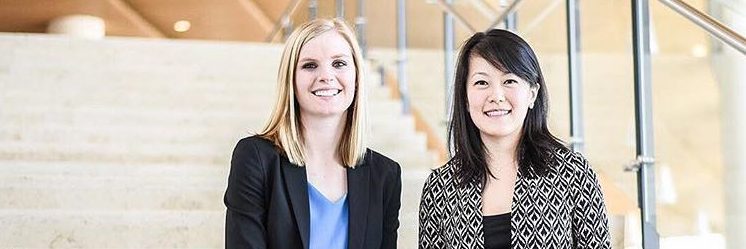
Avery Beach and Jennifer Zheng
Serving as co-presidents of the Sloan Senate has been important to both women personally, but the experience has also convinced Beach and Zheng that it its important for other women, particularly female MBA students, to take on leadership roles within their programs and schools.
“Women are often underrepresented at the top of the career ladder,” they said. “By leading early and regularly, women can stand out in the current job market as well as in their future careers, such as during promotions. We hope that women continue to strive for these experiences.”
In the end, Beach and Zheng have felt empowered by their positions as Senate leaders and hope other women will feel the same. “As we look to the legacy we’ve left at the school, we hope to be remembered not only as effective female leaders, but as effective leaders—that is what will make a difference,” they said.
This article has been edited and republished with permissions from our sister site, Clear Admit.
Why McKinsey & Company Loves Hiring MBAs
McKinsey & Company is considered one of the most prestigious management consultancy firms in the world, with a clientele that includes 80 percent of the world’s largest corporations, along with an extensive list of governments and non-profit organisations. The firm is also a prestigious landing spot for MBAs following graduation. Continue reading…
Top MBA Recruiters: IBM
Finding a job after graduating with your MBA isn’t typically the issue. There are hundreds of industries and companies that would be happy to hire a freshly minted MBA graduate. The trouble is choosing the right company and job for you. If IBM hasn’t been on your list of top tech companies, maybe it should be.
About IBM
Headquartered in Armonk, New York—north of NYC and bordering Connecticut—IBM (International Business Machines Corporation) is a multinational technology company that operates in over 170 countries worldwide. It got its start in 1911, and since that time has manufactured leading-edge computer hardware, middleware, and software. The company also provides hosting and consulting services across the technology industry on topics ranging from mainframe computers to nanotechnology.
IBM is dedicated to a constant state of innovation, which is evidenced by its performance. In 2017, the company earned $79.1 billion in revenue and demonstrated that it’s still a cutting-edge technology company by expanding on many of its services including the IBM Cloud—who’s revenue accounted for 21 percent of total revenue. Other top products from the company include:
- z14: The world’s most powerful transaction system that encrypts data at scale, all the time.
- POWER9: POWER9 systems and software cut training times by 4x and boost AI accuracy.
- IBM Q Experience: The world’s first (and only) prototype 50-qubit system, which leads in quantum computing.
And IBM is always looking for new ways to be competitive. Last year, the company spent $5.6 billion on research and development. And in 2016, IBM filed 8,000 patents (the most of any company). It’s a company that is moving forward quickly, which can make it an exciting prospect for many MBA students. So, why should you work for IBM?
Why IBM?
Nicknamed Big Blue, the appeal of working for a company like IBM is fairly obvious. It’s one of the world’s largest employers with over 380,000 employees as of 2016, and those employees are top notch. Throughout the company’s history, employees have been awarded:
- Five Nobel Prizes
- Six Turing Awards
- Ten National Medals of Technology
- Five National Medals of Science
And some former IBM employees include Apple CEO Tim Cook, Microsoft Chairman John W. Thompson, SAP Co-Founder Hasso Plattner, and former Lenovo CEO Steve Ward.
In addition, if you choose to work for IBM, you have the opportunity to work almost anywhere in the world. The company has several main campuses across the globe including:
- Austin, Texas
- Raleigh-Durham, North Carolina
- Rochester, Minnesota
- New York City, New York
- Silicon Valley, California
- Rome, Italy
- Winchester, UK
- Johannesburg, South Africa
- Tokyo, Japan
And that’s just to name a few of IBM’s premier locations. And no matter where you land a job, you’ll be called an “IBMer” and receive a myriad of benefits including group life insurance, survivor benefits, paid vacation, and more.
In 2017, IBM was also recognized by Mogul as one of the Top 100 Innovators in Diversity & Inclusion as well as one of the Top 100 Companies for Millennial Women. And in 2015, IBM was named to Working Mother’s 100 Best Companies list for the 30th consecutive year.
Landing a Job at IBM
So, how do you land a job at IBM as a new MBA graduate? There are a few options. The first is the IBM General Management Leadership Development Program (GMLDP), which is the premier leadership development program for top MBA graduates. If you’re accepted, you’re hired into IBM on an accelerated path to leadership with opportunities across many of IBM’s areas including cloud, Watson, digital, offering management, and consulting.
And speaking of consulting, MBA graduates also have the opportunity to work as consultants in IBM Global Business Services. Within this area, MBA consultants are given a chance to combine sophisticated analytics with market-leading global solutions to provide deep industry insight and expertise alongside an actionable plan.
At any given time, there are over 5,000 job openings available in every industry and area from project management to marketing. Some available jobs for MBA graduates include:
- Strategy Consultant
- Projects Manager
- Account Executive
- Offering Manager
- Associate Partner for Tech/Data Strategy
- Digital Business Consultant
- Business Analyst
Meet an Employee
According to Nish Parekh, who leads IBM’s client and partner programming teaching businesses how to use IBM’s Watson technology, she’s living her dream. With Watson, she gets to work on the leading edge of AI technology and touch a variety of industries, which is exciting in and of itself.
“They bring in a lot of people from different parts of IBM, as well as some folks from outside IBM. Seeing the mix and all these people work together is fun. I get to learn from them,” Parekh told Fast Company. “Also, one of the greatest things about my job is the ability to stay on top of the latest and greatest technology. AI is up and coming; it’s exciting to be a part of that moment.”
The MBA Real Estate Boom: Inside The Schulich Real Estate Program
Real estate is booming. In fact, according to the Financial Times, commercial property asset values and investment yields have surpassed levels prior to the Great Recession, and there is continued strong demand for offices, urban apartments, and more. It’s all thanks to continued low interest rates and tight supply.
What has this real estate boom meant for business schools? It’s meant a decrease in interest in banking and an increase in interest for real estate study, particularly among MBA students who understand the cycle and want to get involved while they can. The reality is that there are many jobs in real estate, and that’s what MBA students want.
According to Sherena Hussain, an assistant professor in Infrastructure at the York University Schulich School of Business, “The real estate and infrastructure sectors account for a large proportion of a nation’s GDP.” So, it shouldn’t be surprising that many top MBA programs are prioritizing real estate curriculum, specializations, and clubs for their students.
Real Estate and Infrastructure at the Schulich School
Real estate and infrastructure have an indispensable role at the Schulich School. Not only does the school offer a Master of Real Estate and Infrastructure (REI), but MBA students can also specialize their curriculum with a focus on REI. The MBA specialization focuses on “creating and maintaining places for living, working, shopping, learning, recreation and culture, and the critical accompanying support systems ranging from mobility and logistical networks, to utilities and energy supply,” according to the school website.
One of the reasons behind the MBA REI specialization at Schulich is Toronto itself.
“Many of the leading global Real Estate and Infrastructure firms are located in Toronto,” explains Hussain. “If you are interested in a career in real estate and infrastructure, Schulich’s MBA specialization is a rare opportunity to develop your understanding, skills, and network in a way that leverages the specialization’s top-tier reputation and committed faculty and alumni base.”
As part of the REI specialization, students must complete 12 credits focused on real estate including two required courses: Real Estate Finance & Investment and Development Prototypes. Other potential courses include:
- Partnership Models for Infrastructure Delivery
- Structuring Real Estate Transactions
- Commercial Real Estate Asset Management
“The idea behind the REI MBA specialization is to bring students to industry and industry into the classroom,” Hussain outlined in an email exchange with MetroMBA.
“Our faculty and sessional instructors have real-world experience and bring this perspective into the classroom by leveraging experiential learning at its finest. Examples include flying in senior policy officials to judge a capstone assignment about international infrastructure, bringing leading CEOs into the classroom as guest speakers in REI investment classes, or partnering with a leading national-law firm to have our students learn how to negotiate joint venture agreements. This is a small sample of how the REI MBA specialization approaches holistic learning.”
But holistic learning isn’t just regulated to the MBA program and inside classrooms. It can be found throughout the school, including within Schulich’s Real Estate and Infrastructure Club (SREIC).
Schulich Real Estate and Infrastructure Club
SREIC is open to all Schulich business students interested in learning more about pursuing a career in real estate and infrastructure. The club acts as a liaison between students, the industry, and professionals.
“SREIC offers MBA students an opportunity to supplement their learning with real-world, co-curricular programming and unique networking opportunities,” says Hussain. “It’s a student-run group that has the full backing of Schulich’s Real Estate and Infrastructure program faculty, and it is one of the most active student groups at the business school.”
Programming offered by the club includes:
- Value-Oriented Programming: site visits, breakfast seminars, conference engagements, project panels, case competitions, etc.
- Deep Industry and Alumni Relations: on a one-on-one and broad basis through speed mentoring, recruitment breakfasts, and keynote events.
- Leadership Development Opportunities: including the semi-annual resume book circulated to recruiters and senior leaders.
There are also several keynote events that take place each year including Schulich’s Developers’ Den international case competition, ARGUS training, and Schulich’s annual Perspectives Lecture. And one event that just took place in February was the annual New York City real estate study tour.
The study tour is part of a partnership with Columbia University’s real estate program, beginning several years ago. It’s a three-day intensive and transformative real estate experience that takes students to site visits and tours of leading real estate and infrastructure firms all over NYC. Some of those firms include Blackstone, Related Companies, Oxford, Vornado Realty, WSP, Brookfield, and Silverstein Properties. The goal is to give students a glimpse into the future of real estate
“Schulich students benefit from learning more about a new market, as well as having a basis for global comparative learning,” Hussain explains. “The partnership [with Columbia] offers an opportunity to develop a network of peers engaged in commercial real estate development in New York City and across the U.S. Each year, the club visits a development class held at Columbia University to learn more about their approaches to learning about real estate. In return, the Schulich School hosts an annual friendship dinner in Manhattan to offer more opportunities for students, alumni, and friends of industry from Canada and the U.S. to forge relationships.”
The trek is a unique event that gives Schulich students a chance to explore real estate and infrastructure in a whole new way.
“The 2018 SREIC New York trip was an excellent and well-balanced learning experience for students who are truly passionate about real estate and infrastructure,” says James Chang, an MBA student working to his REI specialization. “A prime example of ‘outside the classroom’ learning with the perfect balance between education, relationship building, and fun. I would highly recommend it to students in the MREI or MBA program to take advantage of this opportunity next year!”
To learn more about real estate and infrastructure at the Schulich School of Business, visit the school’s website.
Starting a Business Straight Out of School? How HBS Supports Student Entrepreneurship
This coming weekend, Harvard Business School (HBS) will host an annual Entrepreneurship Conference sponsored by its own homegrown Entrepreneurship Club. The conference brings together hundreds of participants including “founders, joiners, and venture capitalists,” all of whom hope to connect through a smorgasbord of lectures, panels, chats, and networking sessions.
This year’s conference, scheduled for Saturday, March 31, is expected to draw more than 500 participants, including many top professors and professionals holding court on a variety of topics. Three keynote lectures will be given by CEOs and founders from Catalant Technologies, Strava, and edX. Strava’s Michael Horvath, who is also a professor of entrepreneurship at Dartmouth’s Tuck School of Business, will share his experiences having held several high-level roles at multiple startups.

Tuck Professor and Strava Co-Founder Michael Horvath will give one of the Entrepreneurship Conference’s keynote addresses.
In addition to the keynote lectures, the conference is also stacked with nine different panels. Some will include general discussions on topics such as starting a business during your MBA program and financing your startup. Others are more specific, covering some of the hottest fields in entrepreneurship right now. Examples of these include “Blockchain: The Next Transformative Technology?” and “AI/ML: Artificial Intelligence in Diverse Contexts.” Finally, attendees will also get to take part in a venture capitalist meet-and-greet and a networking lunch and cocktail hour.
HBS is extremely supportive of entrepreneurship, according to Jim Aisner, the school’s director of media and public relations. He spoke at length about the myriad ways in which HBS is a fantastic place for both seasoned and budding entrepreneurs, underscoring the range of support Harvard’s large entrepreneurial community offers to those looking to start their own businesses.
“Entrepreneurship is a major component of life at HBS, with some 35 faculty members doing research, course development, mentoring/advising, and teaching in this area,” Aisner told Clear Admit.
Harvard’s program requires all first-year MBA students to take an entrepreneurship course, and there are also a large number of entrepreneurial-focused electives on offer in the second-year Elective Curriculum. In addition, the school boasts multiple conferences and events that reach programs outside the business school. “There is a whole ecosystem [at Harvard] promoting and nurturing entrepreneurship,” Aisner notes.
Significant Programming Supports HBS Student Entrepreneurs
HBS is also home to the Arthur Rock Center Accelerator, which helps selected teams develop their ventures over the course of the year. In addition, the Rock Accelerator offers summer fellowships to support students from the entire student body who seek to develop entrepreneurial ventures during the summer and hosts a semiannual conference that brings 100 alumni back to campus each year.
Rock Venture Partners is a program that lets small groups of students learn more about investing in startups by supporting Rock Accelerator teams as they go through pitching and starting their ventures. Then there is the Harvard Innovation Lab, or i-lab, a resource available to current students at any Harvard school interested in exploring innovation and entrepreneurship at any stage. “The Innovation Lab creates a hotbed of cross fertilization for teams from across the university,” says Aisner.
Given this supportive environment, it won’t come as a shock that many HBS students decide to start their own businesses rather than pursue a more traditional career path in their post-MBA life. Out of more than 900 students, eight percent of graduates from the Class of 2017 chose to start their own businesses upon graduation, up from six percent in the Class of 2016. Although this growth is indicative of a national trend toward more and more recent MBA grads founding startups, HBS outperforms many top schools in this regard. By comparison, at Chicago Booth just 3.2 percent of 2017 MBA grads went immediately into running their own startups. Meanwhile, at the University of Pennsylvania’s Wharton School, just 2.3 percent of the most recent graduating class founded businesses.
As another indicator of its commitment to fostering entrepreneurship, HBS will host its annual New Venture Competition on April 18th, which bestows more than $300,000 in prize money to outstanding new ventures. Contestants may apply in either the business track, with ventures that drive substantial market value, or the social enterprise track, with ventures that drive social change. This recent Clear Admit article noted that the social enterprise track received 69 entries this year, more than ever before.
Nationwide, more and more students have begun to pursue startups at all stages of their MBA careers. From this weekend’s student-led Entrepreneurship Conference to the wide range of related centers, faculty, and other support, HBS’s investment in nurturing its entrepreneurial students is clear.
This article has been edited and republished with permissions from our sister site, Clear Admit.
The Economist Full-Time MBA Ranking

The Economist's annual full-time MBA ranking measures the salaries of graduates, GMAT averages, and the amount of registered alumni, as well as survey data. Take a look at the publication's 2019 top 100 full-time MBA programs below.




